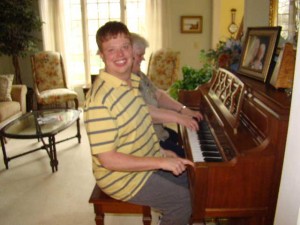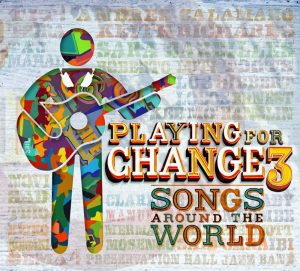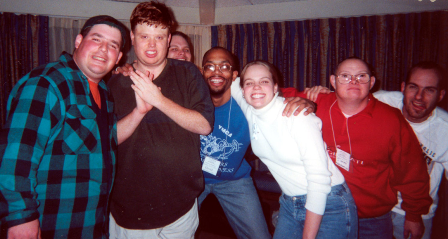In Part 1 (1981) Aaron was 6 years old and we outlined a vision of what a happy, successful quality of life would look like for Aaron as an adult. (click here).
In Part 3, Aaron is now 23 years old and is moving out of his parent’s house and into his own place with a roommate and 24 hour assistance from caregivers. For a peek into his home setting here is an earlier post. (Click here)
When Aaron was getting ready to move out, I wanted to write down some general ideas for the new caregivers. I knew there would be several of them and I wanted to have something in writing that would be in Aaron’s file. I’d read other parents talk about how staff people did not listen to parents. There were also so many details to remember, I knew it would be hard for anyone to remember everything I wanted to say.
Also, Tom and I were meeting with an attorney to try and set up a will and trust. We needed a statement of what we were hoping Aaron’s life would look like should we die.
Here is the report–or list–or letter that passes on some of the information I knew about Aaron.
In some ways this was part of my transition as well as Aaron’s–Part of my ability to let go of giving Aaron care 100% of the time and hoping he would be happy and safe.
We planned on taking Aaron home every weekend, and we planned on having the staff become part of our extended family and Circle of Friends.
We knew Aaron and the staff would work out their own ways of doing things, but it just seemed to make sense, that when Aaron couldn’t talk for himself, there would be some written communications about his likes and dislikes.
Aaron Ulrich (12-18-74)
November 25, 1998
Aaron’s Likes and Dislikes:
>
Aaron is a very friendly person who likes to be around other people.
He sometimes will watch you from a side-way position instead of looking at you straight-on (He doesn’t like to watch much television, but will watch TV most comfortably from a side position also).
Aaron is also very intelligent. He will understand everything you say. Though, like most of us, he has selective listening when he doesn’t want to hear what you are saying. i.e. “Aaron it’s time for bed.” You want to talk to Aaron in a normal voice. He doesn’t like it when people try to talk to him like he was a baby. He doesn’t like high-pitched or very loud voices.
Movement Disorder/Autism
Aaron sometimes likes to be by himself, and will sometimes try to avoid being touched. At these times, I allow him to get his radio or a magazine or look out the window in his room (open the blinds). If he wants private time in his bedroom to lay on the floor and masturbate I will shut his door.
Some people will tell you people with autism don’t like to be touched or be with other people. That is not true with Aaron. Sometimes he likes to be by himself, but most times he likes being with other people. He is very sociable and friendly.
Aaron likes hugs and “Hi 5’s” and will shake hands. He will sometimes come and sit by you on the couch and very much want to be a part of things. Sometimes he will initiate these, but many times because of his movement disorder, he may have to be touched (either on the shoulder, or actually turned on the floor into a position where he can get to his knees) and formally invited to join in.
One way of getting him to join the group is to offer him a transition object. i.e. “Aaron, here are some cards, or a book to take to the living room.” “Give this to James” (his roommate.)
If you are interested, I have a book with more information on movement disorders written by Anne Donnellan.
Aaron uses facilitated communication to type messages. His typewriter is in a gray bag in his closet. His computer is in the room downstairs, it needs to have the initial program reinstalled at Microcenter. Tina Veale is his best facilitator, and she begins speech therapy again on Dec. 4th. If you are interested, I will provide the book Aaron wrote and a video about Facilitated Communication.
Books
Aaron is particularly interested in Science and People. I try to find books, textbooks and/or encyclopedias with lots of pictures on these topics. I try to find age-appropriate books that would be used by other people his own age (not picture books young children would use. We are always looking for more books, because they tend to not last long. Aaron will lick the pages of the books, when they get beat up or torn throw them out and let me know so we can get more books.
Cards to Flip and Sort
He also likes cards any topic: playing cards, picture cards, sports cards. These seem to calm him and are good for “waiting” times i.e.. in the car, lines in grocery stores…” He will pass the cards back and forth with you.
Aaron has Balance issues.
He will bite his hand or grab the closest object (which could be your arm or hair) if he is in a situation where he is off balance.
I try to place his hand on banisters or on escalator handrails wherever possible. He loves elevators, but again, I place his hand on a wall or handrail in the elevator. I grab his hair back and he will release your hair. This is almost an automatic response and usually it only takes touching his head for him to release.
We have found that placing a doormat at the place where he is to step seems to help him focus and position his step. This includes a bathmat in the bathroom and doormats by the front door and the bottom of steps (including the basement).
Another good idea is to take cards, etc. away from him as he goes down the stairs so he can use both hands for balance. If he gets in a position where he cannot move or is moving very slowly, place a hand on his shoulder; or have a person in front of him i.e. he will go up and down the steps on the bus faster if another person is in front of him, it is better for him to be in the middle of the line than first in line. Another trick for getting him to climb up or down stairs is to count them out loud (one, two …).
Bathing and Grooming
Aaron does not wipe himself so he will need help after he has a BM’s. His underwear needs to be monitored for discharge. Aaron will initiate going to the bathroom by himself, but he should be reminded to go whenever you are getting ready to leave the house. If you are in the community insist on him going every 1 1/2 to 2 hours more if he is drinking lots of liquids or has just finished swimming. Sometime Aaron will say, “Bathroom” or give the sign for “Toilet”.
Aaron likes leisurely baths. We think this might be because he can sit down and control his balance. Liquid soap with aloe (for his sensitive skin) is to be put on the sponge. The sponge stimulates his skin and helps in relaxation. This is a technique that is called “rubbing” in physical therapy. Usually I will give Aaron the sponge and encourage him to wash his private parts which he can do with some success. Then I will reapply the soap and scrub his underarms and privates again–particularly the right side of his upper groin area. (This is an area that will often get a rash.) Aaron does not wipe himself after using the bathroom so his bottom needs to be washed well. Aaron gets his hair washed with a mild shampoo every day. I usually use Ivory – full body or one of the others with no conditioners. Usually it has worked best to use a pitcher to rinse. Aaron likes his eyes wiped immediately after with a towel or wash cloth. Lastly, I wash Aaron’s face with a wash cloth. Watch for a big smile as you wash his forehead and cheeks:) . Aaron does pretty well in getting out of the tub. He has learned to brace his feet on the opposite side of the tub. If he leans forward he is usually able to swing his feet around so he can support himself in rising. When getting out of the tub, place his hand on the wall or on a rail for support. He likes a good rubbing with the towel, particularly on his back (Almost like a massage). Aaron will take a shower, which work well when you are in a hurry, but he loves baths.
Because Aaron will sometimes pinch, it is a good idea to make sure his fingernails are very short. His clippers for fingers and toes are in his top drawer.I try to use the clippers after his bath when his nails are soft. Sometimes you can only do one or two nails at a sitting, then you must wait until he is calm and try again. I try and cut his fingernail and toenails after his bath when they are soft.
Eating/Drinking
Aaron sweats a lot, so he needs lots of liquids. One soda pop per day is best. He usually chooses Diet Pepsi. If he drinks more than one pop, Aaron gets hyperactive and will sweat. He drinks a pop at the police station each morning on his job (ask the job coach if he is still doing this.) so alternative drinks are ice water, weak ice tea (so not to stain his teeth), and fruit drinks. I try to stay away from the red dye colored products. Aaron likes to drink his milk with ice in it. He also likes to chew on the ice. I try to get 1%, (the fat free seems to spoil so fast). Aaron can pour his own drinks from the fridge, though he will need to be monitored. He can put his cup in the sink when he is finished.
In order for Aaron to be able to go for Horseback Riding in the Spring, he cannot weigh more than 175 pounds. Dr. Freeman has written a prescription for a dietitian which was
given to Gloria after our Doctor’s visit last week.
Aaron’s diet is very important because only through monitoring his diet and vigorous exercise will we be able to keep Aaron off medication.
Morning Routine
In the morning Aaron has a very acid queasy stomach. If he drinks milk or orange juice without food, he will vomit (reminding me of a pregnant woman). We have found that if we give him a soda cracker or a couple oyster crackers immediately upon waking up, then he is fine and can eat breakfast. I usually force him to eat the cracker (put the oyster cracker in his mouth almost like a medication) but I do not force him to eat breakfast. He used to like to eat 1/2 a peanut butter and jelly sandwich before he caught the bus, and take 1/2 the sandwich with him. His snack at the police station is essentially his breakfast (ask the job coach about this).
Snack
Because Aaron has a one on one job coach at the police station, a fruit cup (low calorie) with a plastic spoon and a peanut butter and jelly sandwich (could be the one he didn’t finish at breakfast) and a napkin. The job coach should be consulted about how this is working. Often the policemen give Aaron treats.
Lunch
Aaron is not big on Ham, but will eat most anything else. Because there is noone to supervise at the workshop I usually used plastic sandwich bags that folded over, not zip lock. Aaron can open a bag of pretzels if he really wants them.
I can hardly think of his lunchtime at the workshop without an anxiety attack, again check with Vicky to see how this is working.
I try to fit both his snack and lunch in his backpack so he doesn’t lose them in transit.
Dinner
Aaron can help set the table with a placemat and after they are washed, he can sort the silverware into the drawer. He can clear dishes though you have to make sure he doesn’t just throw them into the sink (they break).
Aaron will need to be reminded to eat slowly. He alternates left and right hands, his food will need to be cut up. If he is eating too fast, the system from home and school was to put the sandwich or fork down between bites. It is unacceptable for him to grab food from anyone else’s plate. He will use a napkin if reminded. He is to keep his food on his placemat (that is his space).
Aaron likes most all foods. Favorites: sharp cheddar cheese, popcorn, pretzels (nonfat) drinks, drinks, drinks, not big on candy and for some reason has decided he doesn’t like ham. Everything else look out! I’m trying to get him to cut back on french fries and choose something else.
Future Goals
Aaron really likes a schedule and some structure. A schedule book and a set routine like swimming and gym on Monday and Wed., grocery on Tues….. Aaron used an order book at restaurants when he was in school, he also participated in grocery shopping. I have some information on this if you wish.
There are two cookbooks with pictures (from his friend Julie) which have simpler recipes near the counter. I would like these to become some of Aaron’s ISP goals when things get settled.
Aaron says “hamburger” and “popcorn” for most everything. They usually mean he is requesting food. Though they might be his way of engaging you in conversation and have nothing to do with food.
Aaron has two exercise bikes downstairs. He will ride them if someone else rides the other. He will also play some notes on the organ if you sit close to him on the bench or a close chair. I usually try to touch him- my leg to his leg. Again this is another form of the movement disorder and using facilitated communication. If he is sitting at the table, he will be more calm if someone else is also sitting at the table, he will eat if someone is also at the table eating….
Aaron also likes to look at pictures, so we will be giving him a camera to take some pictures for scrapbooks for Christmas.
I hope this gives the basics, Aaron is just a great loving person. I hope you can love him as much as we do.
Additional Thoughts after Aaron actually moved in.
November 29, 1998
Clothing
Because Aaron is always hot, I try to put him in layers of clothing with a t-shirt underneath that could be his shirt if he needs to get cooler or if he spills anything on his shirt. Aaron has started to be bothered by his neckline, so recently I have been getting him V neck t-shirts and/or golf type shirts with buttons. This seems to reduce his discomfort and saves the shirts from figorous pulling at the collar. For sweat shirts I get him X-Large so he can take off the shirt himself when he is sweating.
Toileting
Aaron is to always sit down when he goes to the toilet. Because of his movement disorder, this helps his balance. Plus, his aim is terrible and this saves the walls, but sitting down is the only way I have figured out for a much more serious problem. In public restrooms, Aaron cannot use a zipper like most men, which then means he has to pull down his elastic waist pants exposing much more than the typical person. This not only makes him more vunerable to abuse, but it has caused some smaller children to become afraid (one parent told me he had exposed himself to her son). In order to be consistent across environments and avoid unnecessary safety risks, it has been our policy at school and home to just have Aaron go into a stall and sit down.
Aaron will need to be reminded to flush. This has been a major goal for a long time. Usually a gestural point to the toilet is enough. A verbal prompt “Flush the toilet” is plan B. I usually body block him so he cannot leave the bathroom until this is done.
Teeth
Aaron needs to have his teeth brushed 2 times daily. After his cracker in the morning and at night. Aaron will often gag. I let him try to brush and usually I sing three times: “This is the way we brush our teeth, early in the morning (before we go to bed). After he pushes the brush around in his mouth, I take the toothbrush and scrub more completely. Aaron has to go to the hospital and be put under for cavities and intense cleanings so thorough cleaning is important. The dentist said we need to be extra concerned about his front bottom teeth, front and back.
If Aaron has milk or pop before he goes to bed, I try to give him a little water to rinse off his teeth. Aaron has been able to go through the motions of gargling water at times, he is good at spitting.
Illness
Aaron is very seldom sick, but because he can’t tell you verbally there are signs to look for: He will get feverish and be laying around more than usual; He will be pulling on his ears or will seem to want his radio very loud (usually means ears are plugged with wax); For these two conditions I usually have Aaron go to the Doctor.
Sometimes Aaron will be congested. Aaron does not blow his nose, so he has no way to get out the phlem. When he seems to be getting a cold, I will give him Benedryl to dry him out (in top drawer). Sometimes I will use a vaporizer over night, which seems to help a lot. If his nose gets crusty, put a little vasoline under his nose.
Sometimes he will throw up. Aaron will not make it to the toilet so either a bowl or a towel are put up to his mouth. Aaron usually throws up in twos, so after the first burst, wait a moment and then a second round will begin. Then usually I wash his face with a warm wash cloth, and let him soak in a medium warm bath (not hot) and give him an ounce of pop when he wants it. I only let him have one ounce at a time. He will keep saying “drink” but he gulps it and then throws it up again.
Aaron sometimes get a rash on his groin area. This area needs to be washed and dried after each bath. Prescription cream is in his top drawer if rash develops. First apply the Lamisol, then the Hydrocortizone cream.
Aaron can take small pills but has trouble with larger pills. If medication can be given in liquid form or small pills he does fine. For pills, place one pill in his right hand and have a glass of water ready in his left hand.
Note: Aaron is extreemly sensitive to the sun. He can sunburn in Summer and in Winter and should wear sunscreen whenever in sun for over 15 minutes (in top drawer or in backpack).
If you have any other questions, I’m just a phone call away.
Thanks for working with Aaron. I know you will soon learn all the little things that make him such a loving person.
Would all this detailed information be helpful? Do you want to take bets on whether the caregivers and staff even looked at this?????? What would you do?

![]() photo credit: qthomasbower
photo credit: qthomasbower


